Garden Tools: Where to buy them, what to look for, and what to get:
Don’t buy garden tools at the big box stores
Good tools make work easier, crummy tools make it harder. I would recommend against buying garden tools from a big box store, and be careful if buying them from Ace/True Value/local hardware store. The average customer doesn’t know a difference, so these places typically stock tools that are cheaper and have higher margins for the retailer. They may work OK, at least for a while, and are significantly cheaper than better tools. A quality high-carbon steel tool head may look a lot like a soft steel head that won’t hold an edge or be strong enough to withstand heavy use, but costs much more. Same goes for strong hardwood handles vs. weak pine wood. A quality tool will be lighter, sharper, and stronger than a cheap tool, and last much longer. If you can afford it and are going to spend significant time using it, it’s worth seeking them out from quality retailers.
Example: One of worst tools I ever had was a hoe from a big box store. It had a rectangular steel blade welded to a bent steel rod, which disappeared into the socket of the hardwood handle, that was coated in a weather resistant red covering. It looked like this, but red:
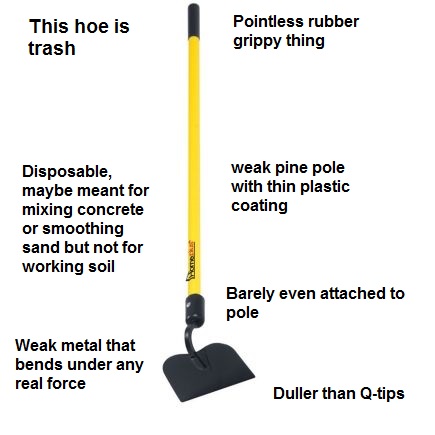
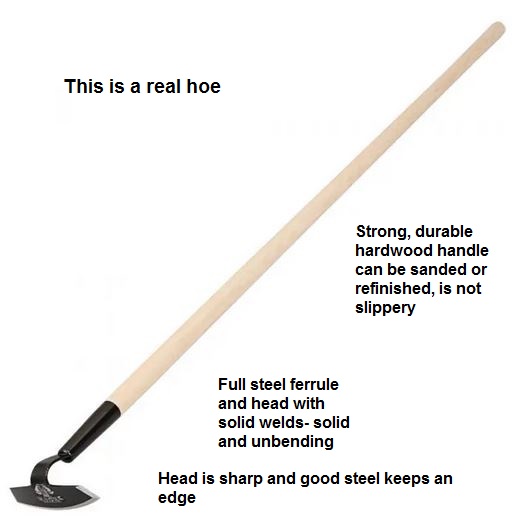
In using it, it became clear that the tool was too dull to cut weeds or dig into the soil. The steel head was just flexible enough to have a spring effect and take extra effort in doing anything. It was heavy, and more of the work seemed to go into moving the tool then moving what I was trying to move. After a few years, the head came out of the socket, where it became clear that the bent rod was just glued into the end of the pine wood rod that ran up the middle of the handle. So every time it was used, it would wiggle in the hole (which was just soft pine wood), so the hole would get bigger. And the red coating was actually a very thin layer of steel, which made the tool heavy and slippery while insuring that the wood never dried out if it got wet. In retrospect, it was probably best suited to mixing concrete.
My replacement hoe (described below) is lighter, stiffer, and sharp enough to slice dandelions off at ground level in one motion, so it makes gardening easier. The head is attached with a solid socket that is riveted through the ash handle, so it is strong enough to pry medium sized rocks out of the ground. I like that I can see the grain of the wood, and the edge of the steel, and that I can sharpen it as needed and replace the handle and still have a great tool until it wears down to a nub.
Where I buy my garden tools:
- AM Leonard (external link) is a big name in the landscaping industry, and many of their tools have lifetime warranties. They always have rotating specials for % off, free shipping, etc., so don’t pay full price there if you can wait a bit longer. Their customer service is pretty good; my wheelbarrow came with the wrong sized leg, and they sent me a pair of correctly sized legs quickly and without any hassle.
- TreeStuff (external link) for arborist supplies, good selection of pruning saws
- Forestry Suppliers (external link) for a lot of general outdoor stuff
- Local specialty dealers, such as knife stores for axes and high-quality nurseries and garden centers
- Direct from manufacturers, depending on the product and company
- Southern Exposure (external link) an excellent source for vegetable seeds, as well as seeds for herbs and flowers. Lots of organic and heirloom options, and mostly from a network of small seed farmers.
- Burnt Ridge Nursery (external link) mail order nursery for seedlings producing fruit and nuts. an excellent source for vegetable seeds, as well as seeds for herbs and flowers. Lots of organic and heirloom options, and mostly from a network of small seed farmers.
- Stark Brothers (external link) mail order nursery with many popular cultivars of fruit trees and other plants. Sometimes pricier, but their stuff has been good quality so far.
- Blackberry
- Blackeyed Susan
- Elderberry
- Fig (if kept from getting too cold in winter)
- Ground Cherry (I don't really like the flavor, but then again I don't like raw tomato, its cousin)
- Mint (will get out of control)
- Peppers (serranos and poblanos)
- Purple coneflower
- Radish (another taste I'm not a fan of)
- Raspberry
- Sour Cherry
- Sunflower
- Apples (managing structure, pests and diseases)
- Artichoke
- Ginseng
- Peach/nectarine (pests and diseases)
Garden Tools I Use
 |
Soil knife AM Leonard Soil Knife ★★★★★ - This is great all around tool. Good for bags of mulch, digging soils, separating soil from sod, prying small rocks out, prying out woody weeds, and throwing into the ground mumbley-peg style. The little notch in the side is great for cutting twine, and the built in ruler is good at planting time, solid synthetic handle. It’s rust resistant but still quite sharp, had a friend leave his outside for extended periods and it did fine. I got a sheath for mine, but it gets twisted if you squat a lot, and I typically hang it somewhere nearby or leave it in my crate of garden tools. |
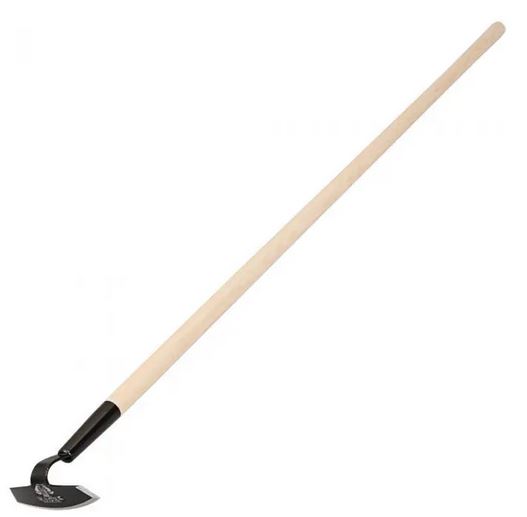 |
Hoe ProHoe 5.75" garden hoe ★★★★★: good steel, light weight, good edge, can be used to shave weeds like hairs, rather than just chopping. The sides are also sharp and great for weeding in narrow spaces. |
 |
Shovel: AM Leonard closed back, round point ★★★★★ love the filled in back for heavy clay soils. Can lever on this, pry out chunks of soil or plants and it puts the pressure on the work, not on its handle. Keep it half-sharpened. |
 |
Axe: Husqvarna traditional forest axe ★★★★ forged steel, lightweight, handle’s a little shorter than I like but works just fine. Not for felling big trees or splitting firewood, but just fine for anything under 18 inches, softerwood. I think the head is forged made by Hults Bruk, a Swedish axe maker dating back to 1697, and this looks a lot like their Aneby model, which was more expensive and had a different sheath. |
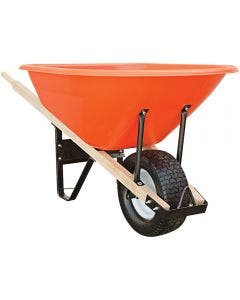 |
Wheelbarrow: AM Leonard poly, 6 cubic feet ★★★★ never have to mess with flat tire, pretty light all told, quite tough but starting to show signs of age after a few years of sun exposure, handles are a little moldy. Less of it likely to rust. |
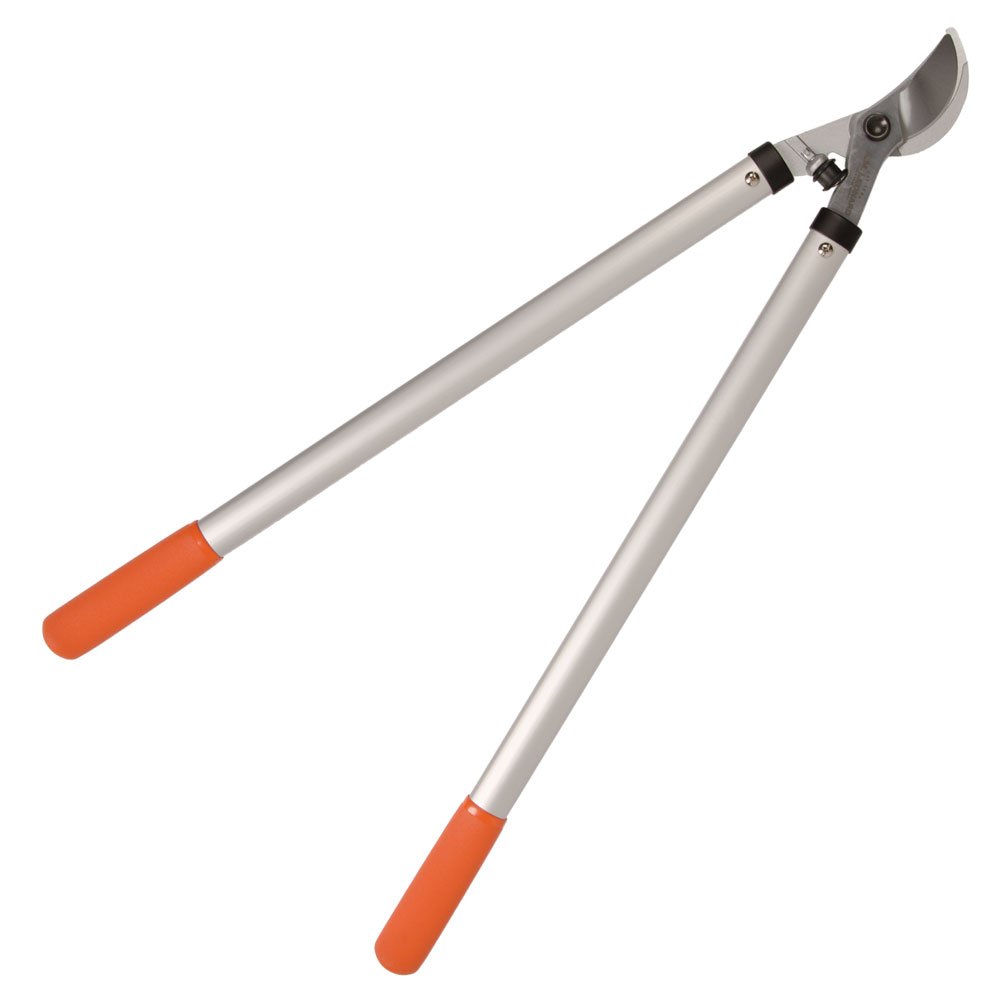 |
Loppers: AM Leonard Loppers ★★★★★: Sharp carbon steel, smooth action, strong and good grip. Very light, great for working overhead. |
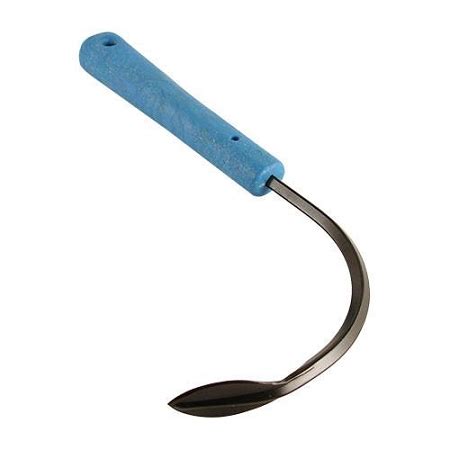 |
Cultivator: Cobrahead ★★★★ Very strong, useful for random tasks that pop up like getting deep roots out, prying up stones, pulling blackberry thorns out of the way, and lots of other things. |
 |
Small chainsaw: Black and Decker Alligator Saw ★★★★ Very convenient, fast, bar prevents kickback injuries. I have the cordless model, but if you're not going farther than your extension cord, that model is cheaper. |
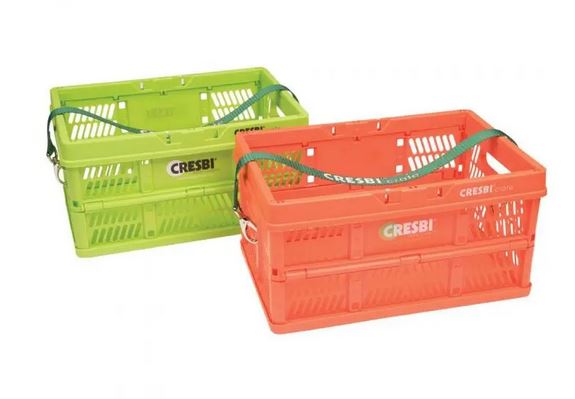 |
Crates CRESBI Collapsible Crate ★★★★ Folds flat, has a good handle, good for lugging tools or carrying the harvest. |